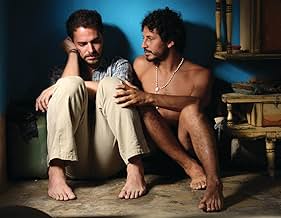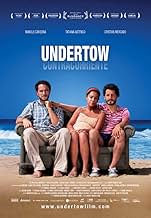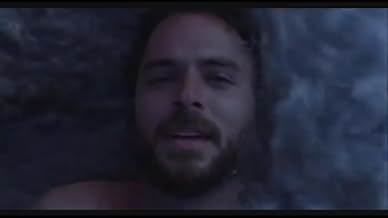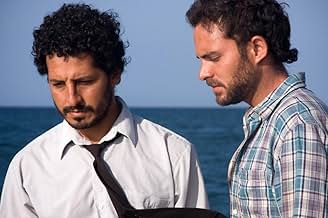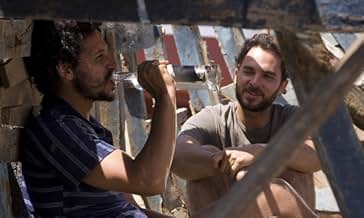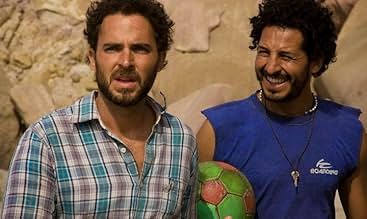IMDb RATING
7.7/10
7.4K
YOUR RATING
An unusual ghost story set on the Peruvian seaside; a married fisherman struggles to reconcile his devotion to his male lover within his town's rigid traditions.An unusual ghost story set on the Peruvian seaside; a married fisherman struggles to reconcile his devotion to his male lover within his town's rigid traditions.An unusual ghost story set on the Peruvian seaside; a married fisherman struggles to reconcile his devotion to his male lover within his town's rigid traditions.
- Director
- Writer
- Stars
- Awards
- 13 wins & 13 nominations total
Humberto Cavero
- Padre Juan
- (as Julio Humberto Cavero)
Liliana Alegría
- Carlota
- (as Liliana Alegria Saavedra)
Tomas Fernandez
- Sabino
- (as Tomás Fernández)
- Director
- Writer
- All cast & crew
- Production, box office & more at IMDbPro
Featured reviews
" Undertow", gut-wrenching and quietly powerful Peruvian movie, brings back the faith in the power of story telling. This forgotten art seems to have passed by most of our contemporary film-makers. Luckily it didn't Javier Funtes-Leon. Small fishing village seemingly locked in time capsule. Grueling work, old-time believes, church on Sundays and communal meal after. Everybody knows everybody, or do they? Small towns, like little tribes, include all members of its community.Up to a point. As long as you play by their traditional rules, you'll be fine. But, just try to step out of the rhythm of the tribal tune, and they turn on you. Of course, this is a movie about a repression of gay people and the horrors they have to endure just because they are different. But, it is so much more. The indictment of empty traditions, false morals and greatest possible cheer for personal courage. This is the life we have, these are the cards we are dealt and play we must.With our head up high and damn the consequences, or hiding and trying to please all but yourself. Doesn't seems such a hard choice to me, or is it?
One of the best new films exploring gay male identity, love and relationships, and likely will be a worthy addition to many personal "favorite gay films" lists, although the fact that the film is set in a town, and to some extent a culture, where, at least for a large part of the story, many in the town have not yet evolved in their views of LGBT people and issues, created some (ultimate unnecessary) anxiety for me early in the film, and at parts throughout, as to whether the film would be a throwback to older, more stereotyped and limited representations and stories of gay life, although those anxieties were not only relieved by the end of the film, but, as I suggested, the film is an extremely valuable addition to the new wave of gay cinema.
The writer, director, casting director and cast, cinematographer, set designer and other members of the film-making team also do a great job exploring rural, small town life, with its traditions (religious and otherwise...) superstitions, and class differences, and the interplay among the individuals, families and community who inhabit the town, along with the welcome (or rejection...) given to a stranger who comes there, and who many perceive as a threat to the social fabric of the town, and the support (or lack of it...) the townspeople and characters show to each other, ultimately examining the struggle between bigotry and ignorance, on the one hand, and the struggle to overcome that bigotry and ignorance, and replace it with support, respect and love on the other. Most of the townspeople are not financially well-off, but make just enough to get by, working in occupations connected to fishing and the sea, and the way they relate, individually and as a community, to each other (and to themselves, in regard to what is the true definition of a man, of an individual's self-respect) in light of a newcomer who is more financially well-off, and his artistic and suspected sexual/relationship interests, are additional themes of the film, which play out so well in a beautiful, interesting and captivating way, often evoking strong emotions, and at times offering an inspiring catharsis (and perhaps a few tears, in reaction to some sadness, and much beauty.)
And there are many other highlights of the film beyond all that, including the amazingly beautiful setting, in a rural, seaside Peruvian village, the cinematography, musical score, performances, plot twists and turns, the mix of fantasy and reality (and moments where it's unclear to what extent fantasy exists as an aspect of the story's reality.) This is a truly unique and creative film, and one of the most rewarding experiences I've had at a feature film in a long time.
The writer, director, casting director and cast, cinematographer, set designer and other members of the film-making team also do a great job exploring rural, small town life, with its traditions (religious and otherwise...) superstitions, and class differences, and the interplay among the individuals, families and community who inhabit the town, along with the welcome (or rejection...) given to a stranger who comes there, and who many perceive as a threat to the social fabric of the town, and the support (or lack of it...) the townspeople and characters show to each other, ultimately examining the struggle between bigotry and ignorance, on the one hand, and the struggle to overcome that bigotry and ignorance, and replace it with support, respect and love on the other. Most of the townspeople are not financially well-off, but make just enough to get by, working in occupations connected to fishing and the sea, and the way they relate, individually and as a community, to each other (and to themselves, in regard to what is the true definition of a man, of an individual's self-respect) in light of a newcomer who is more financially well-off, and his artistic and suspected sexual/relationship interests, are additional themes of the film, which play out so well in a beautiful, interesting and captivating way, often evoking strong emotions, and at times offering an inspiring catharsis (and perhaps a few tears, in reaction to some sadness, and much beauty.)
And there are many other highlights of the film beyond all that, including the amazingly beautiful setting, in a rural, seaside Peruvian village, the cinematography, musical score, performances, plot twists and turns, the mix of fantasy and reality (and moments where it's unclear to what extent fantasy exists as an aspect of the story's reality.) This is a truly unique and creative film, and one of the most rewarding experiences I've had at a feature film in a long time.
There are lots of things that are not told to us in the beginning or middle of this movie. We do not know who are the characters, where they came from or how they started their relationships. The truth is, we do not need to know that. What we need and by the end of the movie what we want to acknowledge is that this is a movie about love (or different types of love). A movie about grieve and it's most different ways of being expressed. A movie about people and about the way they struggle through their lives to hide what they really are and what or who they really role. This is a movie about loss and pain and also about joy and happiness. In the end, this a movie about being human.
The script is remarkable and it runs away from the clichés and the preconceived ideas you might take while you are walking in the projection room. But even more remarkable are the 3 main characters and the actors who portray them. Cristian Mercado delivers a masterclass in acting. By a comfortable mile, one of the best male acting performances of the year. What is most admirable is the way Mercado can express Miguel's painful grievance: the loss of his lover, the acceptance of what he really his and the loss of his beloved wife and son - there are no hysteric portraits of loss. What you get to see is a outstanding performance focused on the facial and physical expression. Also fantastic the the performance by the Mexican actress Tatiana Astengo.
Could this be one of the front runners for the Best Foreing Language movie of the year? No doubt about it.
The script is remarkable and it runs away from the clichés and the preconceived ideas you might take while you are walking in the projection room. But even more remarkable are the 3 main characters and the actors who portray them. Cristian Mercado delivers a masterclass in acting. By a comfortable mile, one of the best male acting performances of the year. What is most admirable is the way Mercado can express Miguel's painful grievance: the loss of his lover, the acceptance of what he really his and the loss of his beloved wife and son - there are no hysteric portraits of loss. What you get to see is a outstanding performance focused on the facial and physical expression. Also fantastic the the performance by the Mexican actress Tatiana Astengo.
Could this be one of the front runners for the Best Foreing Language movie of the year? No doubt about it.
In early 2010, the first Peruvian film ever nominated for a Foreign Language Film Oscar -- "Milk Of Sorrow" (2009) -- got a U.S. 2-screen release that grossed all of 10K. Clearly UNDERTOW has no Peruvian coattails to ride in on. Despite Sundance kudos and buzz, it's already being ghettoized as a gay film. Yet it clearly is so much more. UNDERTOW doubly violates that genre's political correctness: the lead is both closeted and heroic while the captivating tale constantly eschews white/urbane predictability. We watch two more curve balls being thrown at us as well: next-world fantasy and 3rd world folklore. So this is definitely not "'Brokeback Mountain' meets 'Ghost'" as several critics have written it off in facile reviewer shorthand. But UNDERTOW may well have the power to connect with portions of the mainstream audiences for both of those films -- via word of mouth, curiosity-building press and guerrilla marketing. Our unexpected attraction to a real-life subsistence-poor fishing village and its close-knit, tradition-bound "primitive" citizens are seamlessly woven into the film's cast as well as fabric. Breath-taking cinematography, a script illuminating characters rather than telescoping plot, understated yet powerful performances and a hypnotic world music soundtrack take UNDERTOW far beyond the shorelines of dry-docked movie-making. Many high-concept films have dealt with men forced to choose between family and lovers. Others have pitted unlikely heroes against the mores of society. Nor is a quest to carry out the final wishes of the dearly departed at all innovative. But UNDERTOW combines these themes in a way no writer- director has done before. First-timer Javier Fuentes-León does so with fearless honesty and sublime-on-a-shoestring craft. No surprise then that it's this year's Foreign Language entry from Peru.
This film was the "buzz film" at Frameline, the San Francisco LGBT film festival. It is now in very limited commercial release. I saw it for the second time this week and it's as powerful on the second viewing as the first. It's beautifully filmed in a stunningly picturesque Peruvian fishing village. It features tender and complex performances by the actors in the lead roles, and wonderful authentic performances by native residents of the village location. The story delivers a powerful study in internal conflict, grief, redemption, and the power of love. The director says that the idea for the story came from a screen writing-class assignment to write a scene that happens in a kitchen. The kitchen scene is indeed pivotal to the story, but the moral intricacy of the tale surrounding that scene is testament to a creative genius that you will want to hear more from. You will want to see this film again, and you will want your friends to see it, because the world needs more filmmakers like this.
Did you know
- TriviaAlthough both main characters are Peruvian, the actors who play them are not. Cristian Mercado (the Fisherman) is Bolivian and Manolo Cardona (the Photographer) is Colombian.
- ConnectionsFeatures Direito de Amar (1987)
- How long is Undertow?Powered by Alexa
Details
Box office
- Gross US & Canada
- $108,620
- Opening weekend US & Canada
- $6,749
- Sep 19, 2010
- Gross worldwide
- $602,059
Contribute to this page
Suggest an edit or add missing content


